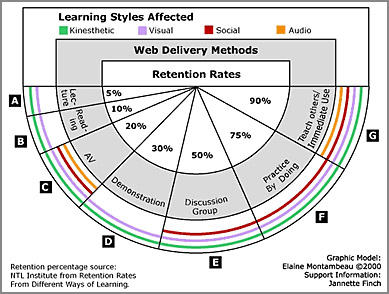User:Lchun
Valerie & Leanne
12345 El Monte Street
Los Altos Hills, CA 88888
Horace Meaniby
Dean of Students
My School
June 16, 2009
Dear Horace,
Thanks for the heads-up on the student complaints on scenario-based learning. We are working as a team on developing and delivering excellent learning opportunities through a new methodology.
The two areas of concern raised by students were
- the lack of lectures on all the skills required for the project and
- the division of work within the student team.
Lack of lectures on all the skills required for the project
Firstly, to address the lack of lectures in the class. The objective of scenario-based learning is to provide an authentic work environment in which to learn the student learning outcomes as they develop the skills.
This course is based on the following assumptions about learning:
- Students retain knowledge best when it is contextualized and related to something they actually have to do.
- Students learn best by doing, and by making mistakes.
- Students solidify skills and expand upon them by reflecting on the strategies they used to solve problems and comparing their solutions with other successful responses.
(Source: NTL Institute, Image: http://www.3dinternet.com/training.html)
- Virtual Training with Simulators - 75% to 90% retention
- Discussion - 50% retention
- Lectures - 5% retention
These assumptions are embodied in the course in the following ways:
Everything the student is asked to do in this course is related to the job of an GreenHealth activitst. To assist in the design and implementation of a Local Food education program, the student must move through a series of tasks, mastering one task before advancing to the next one.
The student may revise and resubmit work several times before demonstrating mastery of skills. The mentor may ask the student to do multiple iterations of each task in order to approximate mastery level. Each round of feedback is designed to move the student closer to the goal of producing professional quality work.
The Scenario-Based Learning instructor encourages students to find answers to their questions and self-correct by accessing the courseware's support features or by consulting supplemental materials. In addition, some instructors choose to provide step-by-step assessment as students learn to use complex technical tools to solve Scenario-Based tasks. This assessment usually takes the form of extended mini-tasks that give students focused practice on critical skills before they plunge into the main Scenario-Based Learning task. The mini-tasks give students a chance to try out their skills, and the instructors can assess student performance. Other forms of assessment are used too, such as reflection discussions at the end of the task and final tests. In all these different forms, assessment in Scenario-Based Learning is designed to focus on the critical professional skills for workplace success and the content knowledge to solve complex problems.
Division of work within the student team
Secondly, addressing the division of work within the student team. As mentioned above, the student teams were given milestones and tasks which were closely monitored. As the mentors, we were following the team discussions, reviewed their notes, and monitored their progress. We intervened when necessary. One of the practices of scenario-based learning is to allow teams to fail, but help them to quickly recover or self-correct. Since working in a team where one of the members leads the group in the wrong direction is a real-world situation, we feel this is a valuable part of the learning process. We did intervene before the team got too far off-base. Eventually, the team was able to work through their differences, get back on track, and turn in an excellent finished project. In addition, the team learned valuable soft-skills relating to conflict resolution in the workplace.
Therefore, although we regret you received student complaints, we feel that scenario-based learning is an effective teaching methodology, providing valuble real-world skills which are more effective than lecture-based learning.
Respectfully submitted,
Valerie & Leanne
